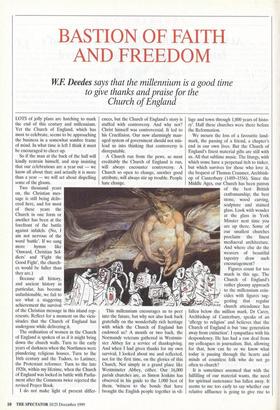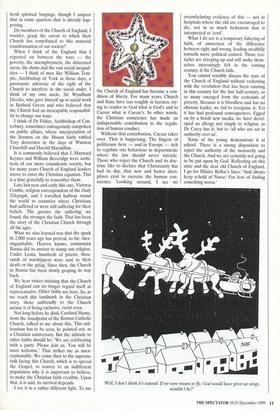BASTION OF FAITH AND FREEDOM
WE Deedes says that the millennium is a good time to give thanks and praise for the Church of England
LOTS of jolly plans are hatching to mark the end of this century and millennium. Yet the Church of England, which has most to celebrate, seems to be approaching the business in a somewhat sombre frame of mind. In what time is left I think it must be encouraged to cheer up.
So if the man at the back of the hall will kindly restrain himself, and stop insisting that our celebrations are a year out — we know all about that; and actually it is more than a year — we will set about dispelling some of the gloom.
Two thousand years on, the Christian mes- sage is still being deliv- ered here, and for most of these years the Church M one form or another has been at the forefront of the battle against infidels. (No, I am not nervous of the word 'battle'. If we sang more hymns like 'Onward, Christian Sol- diers' and 'Fight the Good Fight', the church- es would be fuller than they are.) Because all history, and ancient history in particular, has become unfashionable, we fail to see what a staggering achievement the survival - • - of the Christian message in this island rep- resents. Reflect for a moment on the vicis- situdes that the Church of England has undergone while delivering it.
The ordination of women in the Church of England is spoken of as if it might bring down the church walls. Turn to the early years of darkness when the Northmen were plundering religious houses. Turn to the 16th century and the Tudors, to Latimer, the Protestant reformer. Turn to the late 1920s, within my lifetime, when the Church of England was locked in battle with Parlia- ment after the Commons twice rejected the revised Prayer Book.
I do not make light of present differ- ences, but the Church of England's story is stuffed with controversy. And why not? Christ himself was controversial. It led to his Crucifixion. Our now alarmingly man- aged system of government should not mis- lead us into thinking that controversy is disreputable.
A Church run from the pews, as most creditably the Church of England is run, will always encounter controversy. A Church so open to change, another good attribute, will always stir up trouble. People hate change.
This millennium encourages us to peer into the future, but why not also look back gratefully on the wonderfully rich heritage with which the Church of England has endowed us? A month or two back, the Normandy veterans gathered in Westmin- ster Abbey for a service of thanksgiving. And when I had given thanks for my own survival, I looked about me and reflected, not for the first time, on the glories of this Church. Not simply in a grand place like Westminster Abbey, either. Our 16,000 parish churches are, as Simon Jenkins has observed in his guide to the 1,000 best of them, 'witness to the bonds that have brought the English people together in vil- lage and town through 1,000 years of histo- ry'. Half these churches were there before the Reformation.
Figures count for too much in this age. The Church of England's rather gloomy approach to the millennium coin- cides with figures sug- gesting that regular
-O5 church attendance has fallen below the million mark. Dr Carey, Archbishop of Canterbury, speaks of an 'allergy to religion' and believes that the Church of England is but 'one generation away from extinction'. I sympathise with his despondency. He has had a raw deal from my colleagues in journalism. But, allowing for that, how can he or we know what today is passing through the hearts and minds of countless folk who do not go often to church?
It is sometimes assumed that with the fulfilling of our material wants, the need for spiritual sustenance has fallen away. It seems to me too early to say whether our relative affluence is going to give rise to fresh spiritual longings, though I suspect that in some quarters that is already hap- pening.
Do members of the Church of England, I wonder, grasp the extent to which their Church has contributed to this material transformation of our society?
When I think of the England that I reported on between the wars — the poverty, the unemployment, the distressed areas, the slums and the vast social inequal- ities — I think of men like William Tem- ple, Archbishop of York in those days, a passionate advocate of the right of the Church to interfere in the social order. I think of my own uncle, Sir Wyndham Deedes, who gave himself up to social work in Bethnal Green and who believed that the Church had an inescapable responsibil- ity to change our ways.
I think of Dr Fisher, Archbishop of Can- terbury, sometimes outrageously outspoken on public affairs, whose interpretation of the Sermon on the Mount fairly rattled Tory dovecotes in the days of Winston Churchill and Harold Macmillan.
It is commonly believed that J. Maynard Keynes and William Beveridge were archi- tects of our more considerate society, but for many years Church of England leaders strove to enter the Christian equation. This is a time gratefully to remember them.
Late last year and early this one, Victoria Combe, religion correspondent of the Daily Telegraph, and I travelled halfway round the world to countries where Christians had suffered or were still suffering for their beliefs. The greater the suffering, we found, the stronger the faith. That has been the story of the Christian Church through all the ages.
What we also learned was that the spark lit 2,000 years ago has proved, so far, inex- tinguishable. Heaven knows, communist Russia did its utmost to stamp out religion. Under Lenin, hundreds of priests, thou- sands of worshippers were sent to their death or the gulag. Since then, the Church in Russia has been slowly groping its way back.
We hear voices insisting that the Church of England can no longer regard itself as representative. Other faiths are here. So, as we reach this landmark in the Christian story, those unfriendly to the Church accuse it of being exclusive, racist even.
Not long before he died, Cardinal Hume, from the standpoint of the Roman Catholic Church, talked to me about this. This mil- lennium has to be seen, he pointed out, as a Christian anniversary. But the attitude to other faiths should be: 'We are celebrating with a party. Please join us. You will be most welcome.' That strikes me as unex- ceptionable. We come then to the supreme task facing this Church, which is to spread the Gospel, to convey to an indifferent population why it is important to believe, to make the Christian faith credible. Upon that, it is said, its survival depends.
I see it in a rather different light. To me the Church of England has become a con- dition of liberty. For many years, Church and State have run roughly in harness, try- ing to render to God what is God's and to Caesar what is Caesar's. In other words, the Christian conscience has made an indispensable contribution to the regula- tion of human conduct.
Without that contribution, Caesar takes over. That is happening. The fingers of politicians here — and in Europe — itch to regulate our behaviour in departments where the law should never intrude. Those who reject the Church and its doc- trine like to declare that Christianity has had its day, that new and better disci- plines exist to exercise the human con- science. Looking around, I see no overwhelming evidence of this — not in hospitals where the old are encouraged to die, not in so much hedonism that is interpreted as 'cool'.
What I do see is a temporary faltering of faith, of awareness of the difference between right and wrong, leading stealthily towards more political control. Those ten- tacles are creeping up and will make them- selves increasingly felt in the coming century, if the Church fails.
You cannot sensibly discuss the state of the Church of England without reckoning with the revolution that has been running in this country for the last half-century, as so many emerged from the restraints of poverty. Because it is bloodless and has no obvious leader, we fail to recognise it. Yet it has had profound consequences. Egged on by a brash new media, we have devel- oped an allergy not simply to religion, as Dr Carey has it, but to 'all who are set in authority over us'.
Some of the young demonstrate it at school. There is a strong disposition to reject the authority of the monarchy and the Church. And we are certainly not going to be put upon by God. Reflecting on this state and the dear old Church of England, I go for Hilaire Belloc's lines: 'And always keep a-hold of Nurse/ For fear of finding something worse.'
'Well, I don't think it's natural. If we were meant to fly, God would have given us wings, wouldn't he?'























































































































 Previous page
Previous page